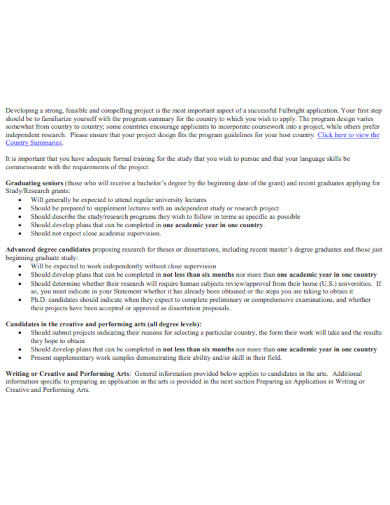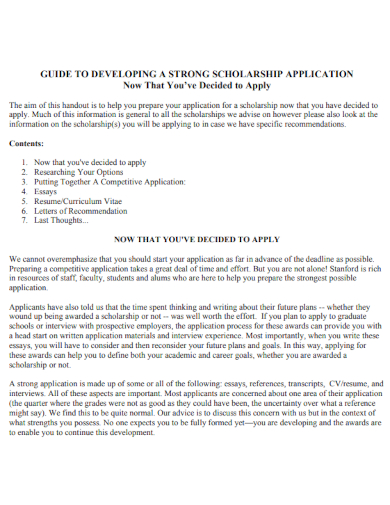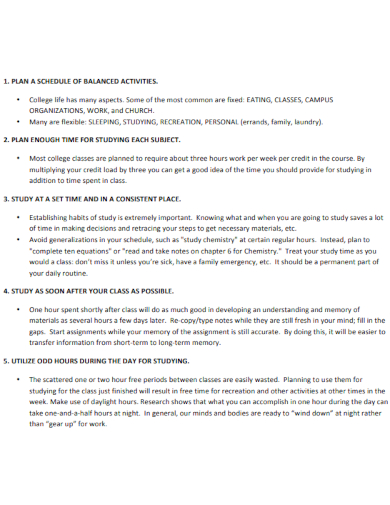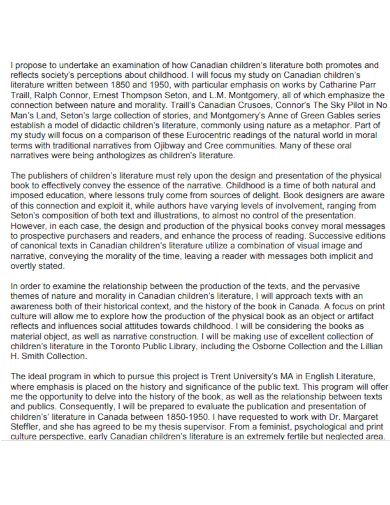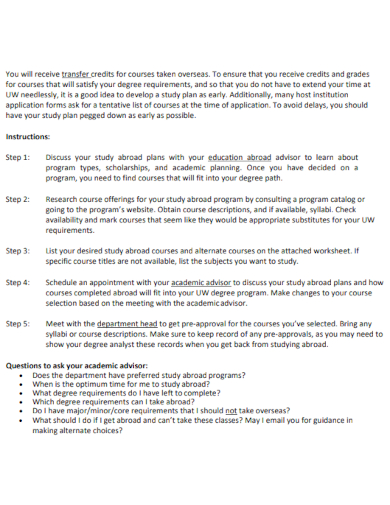4+ Study Plan for Scholarship Application Examples to Download
The process of preparing the necessary documents needed in applying for a scholarship is arduous. There is also that unending worry of whether you can pass or not. Despite that, you are here because you know that this effort is nothing compared to the opportunities it can offer you in return. In addition to filling in scholarship applications and writing career essays, learn how to devise a study plan for scholarship application and secure the scholarship that you want.
What is a Study Plan for Scholarship Application?
A study plan for a scholarship application is a detailed document that outlines an applicant’s strategies and scheduling commitments for achieving academic success during their course of study. It is often a required component of scholarship applications to demonstrate the applicant’s dedication, foresight, and readiness to handle the academic workload efficiently if granted the scholarship. Here’s a deeper look into the elements of a study plan and its importance:
Study Plan for Scholarship Application Format
John Deo
123 Scholarship Lane
Education City, IN 12345
Email: john.deo@email.com
Phone: (123) 456-7890
Date: April 11, 2024
Admissions Committee
The Scholarship Foundation
123 Learning Ave, Suite 456
Academic Town, IN 12345
Dear Scholarship Committee,
I am writing to express my enthusiasm and qualifications for the [Name of Scholarship] as part of my application to [University/College Name]. I am currently a senior at [Your High School’s Name], and I am planning to pursue a degree in [Your Intended Major] this coming fall. I believe that a well-structured study plan is essential for achieving academic success and making the most of the scholarship opportunity. Below, I outline my comprehensive study plan designed to enhance my educational journey.
1. Understanding the Scholarship Requirements
Objective: To thoroughly understand the criteria and expectations of the scholarship.
Action Plan: Review the scholarship guidelines weekly to ensure all requirements are met and align activities to the scholarship’s objectives.
2. Setting Academic Goals
Objective: To achieve a GPA of 3.8 or higher each semester.
Action Plan: Allocate specific hours for study sessions, utilize campus academic resources, and meet with an academic advisor bi-monthly to track progress.
3. Time Management Plan
Objective: To effectively balance academic, extracurricular, and personal activities.
Action Plan: Create a weekly schedule that includes classes, study times, extracurricular involvement, and personal downtime to ensure holistic development.
4. Daily Study Routine
Objective: To consolidate learning and maximize retention of study material.
Action Plan: Dedicate at least three hours daily to studying core subjects, using active recall and spaced repetition techniques to enhance memory.
5. Resource Utilization
Objective: To leverage available resources for maximizing academic success.
Action Plan: Regularly use the university library, online databases, and academic journals. Participate in study groups to enhance learning and understand complex topics.
6. Extracurricular Involvement
Objective: To develop skills and interests outside of the academic curriculum.
Action Plan: Join two relevant clubs or organizations within the university to build leadership skills and professional connections.
7. Health and Wellness Management
Objective: To maintain optimal physical and mental health.
Action Plan: Engage in weekly physical activities and use university wellness resources, including counseling and fitness centers.
8. Regular Progress Evaluation
Objective: To continuously assess academic performance and make necessary adjustments to the study plan.
Action Plan: Self-assess academic standing through regular quizzes and exams, and adjust study methods and schedules based on results.
9. Networking and Mentorship
Objective: To build relationships with faculty and peers that support academic and career goals.
Action Plan: Attend networking events, participate in seminars, and meet with a mentor for career advice monthly.
10. Preparation for Future Endeavors
I am committed to adhering to this study plan as I believe it will help me to not only meet but exceed the expectations that come with the [Name of Scholarship]. Thank you for considering my application. I look forward to the opportunity to bring my dedication and passion for my studies to [University/College Name].
Sincerely,
John Deo
Purpose of a Study Plan
Strategic Academic Roadmap: The study plan serves as a roadmap that guides the applicant through their academic journey, laying out a clear path of what they intend to study, how they plan to manage their time, and the resources they will utilize.
Demonstration of Commitment: It shows the scholarship committee that the applicant has a thoughtful approach and is serious about making the most of the educational opportunity.
Resource Management: It helps applicants plan how they will utilize the available resources (like libraries, labs, and tutoring services) to maximize their academic potential.
Balance and Wellbeing: A comprehensive study plan also considers personal well-being and extracurricular activities, balancing them with academic responsibilities to maintain a healthy lifestyle.
How to Write a Study Plan for a Scholarship
Introduction
Begin your study plan with a brief introduction about yourself, including your current educational status and the degree program you are applying for. Mention how this scholarship will assist you in achieving your educational and career goals.
Example: “I am an aspiring Environmental Science major currently completing my senior year at Springfield High School, eager to advance my education at the University of Wellbeing. This scholarship will play a pivotal role in achieving my goals of contributing to sustainable environmental practices.”
Educational Background
Briefly outline your academic history focusing on achievements relevant to the scholarship. Include information about your current course of study and how it aligns with your career goals.
Example: “My academic journey has been rigorously curated towards environmental conservation, marked by my active participation in science fairs and internships at local conservation organizations, achieving a cumulative GPA of 3.9.”
Academic Goals
Clearly state your academic objectives for the future, including the milestones you plan to achieve during your scholarship period.
Example: “Upon securing this scholarship, my immediate objective is to maintain a GPA of 3.8 or above, while my long-term goal is to publish independent research on renewable energy sources.”
Study Plan Details
This is the core section where you break down your study schedule:
- Weekly Study Schedule: Detail your weekly commitments, including class times, study sessions, group discussions, and lab work.
- Exam Preparation: Outline strategies for preparing for exams, such as review sessions or practice tests.
- Resource Utilization: Describe how you plan to use university resources like libraries, labs, and tutoring centers.
Example: “My weekly study plan is structured around 15 hours of class time, supplemented by 20 hours of dedicated study. This includes group study sessions to enhance collaborative learning and individual sessions focused on research for my thesis on solar power efficiency.”
Skills and Extracurricular Activities
Integrate your extracurricular activities that are pertinent to your academic success. This could include clubs, sports, volunteer work, or other projects that contribute to your personal and professional growth.
Example: “I will continue to engage in the Green Planet club, which aligns with my academic focus and provides practical experience through community-based projects and initiatives.”
Personal Management Strategies
Discuss how you will balance your academic responsibilities with personal well-being to maintain high performance.
Example: “To ensure sustained mental and physical health, I will adhere to a balanced routine that includes regular exercise, a healthy diet, and mindfulness practices, alongside my academic commitments.”
Monitoring and Adjusting the Plan
Explain how you will track your academic progress and the steps you will take to adapt your study plan if needed.
Example: “I plan to evaluate my academic performance bi-monthly, utilizing feedback from professors and peers to refine study techniques and strategies. This adaptive approach will help address any academic challenges promptly.”
Conclusion
Reaffirm your commitment to your educational goals and the scholarship program. Summarize how the scholarship will impact your education and career prospects.
Example: “This scholarship will not only alleviate financial burdens but also enhance my academic endeavors by providing access to premier resources and networks. I am committed to upholding the standards of excellence expected of scholarship recipients.”
Keypoints for Study Plan for Scholarship Application
1. Personal Introduction
- Full Name and contact information.
- Educational Background: Brief summary of current and past education.
- Academic Achievements: Highlight relevant awards and recognitions.
2. Objective of the Study Plan
- Purpose: Clarify the purpose of the scholarship and how it aligns with your academic and career goals.
- Outcome Expectations: Define what you intend to achieve by utilizing the scholarship.
3. Academic Goals
- Short-term Goals: List goals to be achieved during your scholarship period (e.g., GPA targets, specific project completions).
- Long-term Goals: Outline what you aim to achieve post-graduation and how the scholarship facilitates these ambitions.
4. Study Schedule
- Weekly and Daily Plans: Detail your class schedule, study hours, and any part-time job or extracurricular activities.
- Exam and Assignment Prep: Strategies for preparing for exams and completing assignments.
5. Resource Utilization
- Institutional Resources: Plan to use libraries, labs, tutoring centers, and any other academic resources offered by the educational institution.
- Personal Resources: Books, software, and other materials you will use independently.
6. Extracurricular Activities
- Clubs and Societies: Which groups you will join that are relevant to your studies and how they will help you achieve your goals.
- Volunteering: Any community service or volunteering plans that enhance your resume and personal growth.
7. Skills Development
- Academic Skills: Specific skills you intend to develop or improve, such as research techniques, writing skills, or analytical abilities.
- Professional Skills: Relevant skills to your field that you aim to acquire or enhance, such as programming, statistical analysis, or foreign languages.
8. Health and Well-being Plan
- Physical Health: Activities and routines to maintain physical health, like gym schedules, sports, or fitness classes.
- Mental Health: Strategies for stress management and mental well-being, including meditation, counseling, and healthy social interactions.
9. Progress Monitoring and Adjustments
- Review Intervals: Regular intervals at which you will review your progress towards your academic goals.
- Feedback Mechanisms: How you will gather and use feedback from professors, peers, and personal reflection to adjust your study plan.
10. Conclusion
- Reiteration of Commitment: Affirm your commitment to your educational goals and the effective use of the scholarship.
- Summary of Impact: Briefly summarize how the scholarship will help you meet your outlined academic and professional goals.
4+ Study Plan for Scholarship Application Examples
1. Sample Study Plan for Scholarship Application
2. Sample Study Plan for Scholarship Application
3. Bachelors Study Plan for Scholarship Application
4. Masters Study Plan for Scholarship Application
5. Study Plan for Abroad Scholarship Application
Importance of a Study Plan in Scholarship Applications
Evidence of Proactivity: It provides proof that the applicant is proactive about their education and not just academically competent but also well-organized and thoughtful.
Confidence Booster for Committees: Scholarship committees feel more confident about investing in students who show clear intent and preparedness towards their educational endeavors.
Framework for Success: The study plan acts as a framework that can significantly enhance the applicant’s ability to achieve their educational targets efficiently.
How to Devise an Impressive Study Plan for Scholarship Application?
There are probably hundreds of other hopeful students like you who are also aiming to get the scholarship. If you are one of many, rousing the committee will be a difficult task. One weakness or mistake, and your application documents might end up in the paper shredding machine. Ensure to avoid this unfortunate fate by showing off your essay writing skills with your study plan.
1. Highlight Your Achievements
The first thing you should consider in composing your study plan is to outline your academic achievements and academic background. Yes, you are writing this to impress, but you should also remember to include only honest facts of yourself. If you have received any award certificates for particular programs, you should detail them in your essay. Don’t forget to discuss how these attainments contributed to your decision in choosing their school, the scholarship, and the program/degree.
2. Set Your Academic Goals
The next step in your essay writing process is to talk about your long-term and short term academic goals. The committees will give extra attention to this segment. They will evaluate this as a determining factor to determine whether you are deserving of the scholarship or not. You should also align your academic goals to the degree or program you chose to take.
3. Provide a Timeline
Now that you have presented your goals, you should set aside a schedule or a timeline for each item you listed in your objectives. It is important to stay realistic and to know your limits. Do not set a career timeline you cannot follow. It will put you at a disadvantage in the long run.
4. Detail Your Strategic Study Methods
After discussing what you want to achieve and the period to accomplish it, you should answer the how question. That said, you should enumerate a detailed list of the fruitful study strategies and habits you are willing to implement to achieve what you have written in your study plan. If your applying for an overseas scholarship, you should also include how you plan to learn their language.
FAQs
What Should I Write in My Study Plan?
Outline your educational background, academic goals, detailed schedule, resource utilization, extracurricular activities, and strategies for maintaining physical and mental health. Emphasize how these elements help achieve your academic objectives.
How Do You Write a Future Study Plan for a Scholarship?
Include long-term academic targets, describe the preparation for major exams, detail intended use of institutional resources, and explain how you will engage with campus life and external opportunities to enhance your career prospects.
How Do I Create a Study Plan?
Start by setting clear, measurable academic goals. Break down your daily and weekly commitments, allocate time for revisions and breaks, utilize academic resources effectively, and incorporate time for extracurriculars to maintain a balanced schedule.
How Can I Focus 100% on Studying?
Create a distraction-free study environment, set specific goals for each study session, use techniques like the Pomodoro Technique for maintaining focus, and incorporate short breaks to prevent burnout and keep your mind fresh.
What is the 9 8 7 Study Method?
This method involves studying for 9 hours a day using a mix of 3 hours for new topics, 3 hours for review, and 3 hours for practice problems, followed by 8 hours of sleep, and 7 hours of relaxation, meals, and personal tasks.
What is the Study Plan for Student?
A student’s study plan should include a realistic schedule that balances study hours with classes, assignments, and exams. It should also outline strategies for effective learning, such as active recall and spaced repetition, and integrate time for rest and extracurricular activities.
How is a study plan essay from a study timetable?
The glaring difference between a study plan essay and a study timetable lies in their formatting. A study plan follows an essay structure, while a study timetable is a visual presentation of your daily or weekly study schedule. In addition to that, a study plan is a scholarship essay that presents your academic goals for the whole duration of your studying in a particular school, while the latter aims to achieve a daily or weekly goal.
What are examples of academic goals for a study plan?
Setting your academic goals in your study plan can be considerably influenced by the type of scholarship you want. If you are applying for a scholarship for a post graduate school program, you can include publishing a educational research in your goals. On the other hand, if you want to apply for an undergraduate scholarship, you can enhance your leadership and communication skills by joining extracurricular clubs and activities. You can also aim to achieve a certain GPA that you think is reachable for you
What are some productive study methods?
The first tip that you should consider is to look for a study-friendly place. If you have not discovered what type of learner you are, then you should conduct a self-assessment. Doing this will help you know what kind of methods are appropriate for you. In addition, based on the results of your assessment, you should prepare learning materials accordingly. If you learn better when you write, you can prepare notebooks for your notes. On the other hand, if you are an auditory learner, you should opt to prepare abooks. To make studying a routine, you can also construct a five day study plan.
It’s a no-brainer that underprivileged students do not have the same chances of getting a quality education as students from a well-off family. Despite that, there are sponsors, organizations, and universities willing to help open the doors of opportunities to these students. That said, once you come across this situation, exhaust all your efforts by composing an outstanding study plan for scholarship application.



